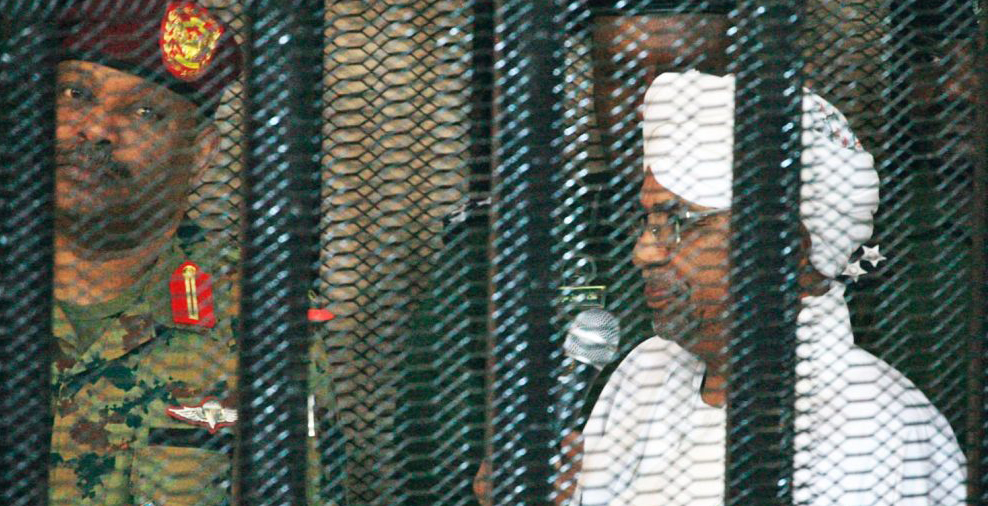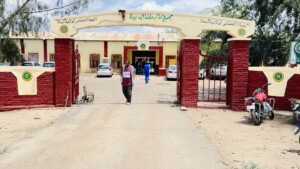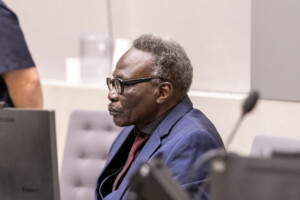Asharq Al-Awsat: Sudanese jurists denounce formation of new ‘anti-empowerment removal committee’

Al Bashir in a Khartoum court, August 19, 2019 (File photo; SUNA)
The decision of Sudan’s chief justice to form a legal committee tasked to reconsider the decisions issued by the Empowerment Removal Committee (ERC), established by the government of Abdalla Hamdok in November 2019, has sparked much controversy in the country.
Sudanese jurists already expected such a move after the return of the regime’s Islamist leaders to the political scene, but wonder about the reasons for this step at this time, writes Mohammed Amin Yassin from Nairobi in a report for the London-based Asharq Al-Awsat international Arabic newspaper yesterday.
On October 13, Sudan’s Chief Justice Abdelaziz Abdeen instructed the formation of a committee of three judges to reconsider the appeals reported against decisions of the ERC, set up in November 2019 with the aim to purge Sudan of the remnants of the ousted regime of dictator Omar Al Bashir (1989-2019).
The full name of the ERC is the Committee for Dismantling the June 30, 1989 Regime, Removal of Empowerment and Corruption and Recovery of Public Funds. Empowerment (tamkin) is the term with which the Al Bashir government supported its affiliates by granting them far-going privileges, including government functions, the setting-up of various companies, and tax exemptions.
The committee’s establishment was stipulated in the Constitutional Document, which was signed in August 2019 between the Forces of Freedom and Change (FFC) alliance and the then Military Council, “to work on recovering public funds that are believed to have been obtained by leaders of the former regime through illegal means”. The committee was also responsible for the dismissal and removal of members of the deposed regime from the high-level positions.
The ERC confiscated hundreds of assets, plots of land and real estate owned by key figures of Al Bashir’s regime, or his allies including owners of companies and investors, even foreign ones, states Yassin. A large number of those accused of illicit enrichment were also arrested in accordance with the committee’s law.
In 2021, the work of the committee was increasingly thwarted. Radio Dabanga reported in early October that the Appeals Department of Sudan’s High Court in Khartoum nullified decisions of the Empowerment Removal Committee regarding the dismissal of judges, prosecutors, and other judicial employees.
Following the coup d’état of October 25 that year, by the Sudanese military, then consisting of the Sudanese Armed Forces (SAF) and the paramilitary Rapid Support Forces (RSF – which later called it ‘a wrong step’), Lt Gen Abdelfattah El Burhan, the president of Sovereignty Council and SAF commander, froze the work of the committee and instructed ‘Islamist Judge’ Mohamed Babiker, aka Abu Sabiha, to reconstitute it.
“Abu Sabiha nullified many decisions issued by the ERC, which recovered millions of dollars obtained by elements of the deposed regime through illegal means,” Yassin explains.
Three ERC members, including its chair, lawyer Wajdi Saleh, were detained in February 2022, following a breach of trust reported against them by the Ministry of Finance.
‘Wrong’
Yassin reported yesterday that a first-degree judge told Asharq Al-Awsat that the chief justice’s decision of October 13 was made “to review those decisions issued by the dismantling committee, which were not reviewed by the previous legal department headed by Judge Babiker (Abu Sabiha), and which were suspended due to the war in the country”.
The judge, who asked not to be named, added that “There may be other parties who want to appeal to the previous committee the decisions of the dismantling committee.” He further pointed out that “this decision opens the door wide to challenge and appeal many of the decisions of the ERC, including the procedures for dissolving unions and bodies that were affiliated with the deposed regime”.
According to the judge, the October 13 decision confirms that all the decisions considered by Judge Abu Sabiha’s committee were “wrong” because they did not follow the gradual process stipulated in the “substantive and procedural” law of the Empowerment Removal Committee which was cancelled after the October 25 coup.
Legal expert Moez Hadra told Asharq Al-Awsat that the decision to form a committee is not new, and that it is a re-formation of Judge Abu Sabiha’s committee after his retirement from work, after the legal department he headed as an appellate stage became non-existent.
Hadra believes that remnants of the “dissolved National Congress Party” of Omar Al Bashir, established in 1998, whose funds were not released after being confiscated by the previous committee, submitted decisions to Sovereignty Council member Ibrahim Jaber, who headed the committee after the October 2021 coup.
“He revealed that Jaber had dismantled all the funds and properties owned by the supporters of the deposed regime, due to his affiliation with the Islamic organisation and his responsibility for the funds of Islamists in a number of countries,” Yassin reported.
Hadra told him that “remnants of the National Congress and the Islamic Movement” returned following the outbreak of war in the country in April last year, and demanded the cancellation of the decisions of the Empowerment Removal Committee.
“According to the committee’s law, the head of the committee, Ibrahim Jaber, cannot do anything, so they worked to reconstitute the judicial committee again to release the remaining funds of the National Congress members that were seized by the judiciary.”
“Issuing such a decision at a time when the country is suffering from war and its disastrous effects on the Sudanese people confirms beyond doubt the control of the remnants of the deposed regime over all state agencies, including the judiciary, the prosecution, and others,” Hadra continued.
“This is not the right time to release the funds of people accused in criminal cases and suspected corruption, which is considered a misuse of the justice apparatus.”
Wajdi Saleh, former ERC chair, confirmed to Asharq Al-Awsat that the decision issued by the Sudanese chief justice to form a new committee to review the ERC decisions “is an extension of a series of measures taken by the October 25, 2021 coup against all decisions issued during the transitional period [2019-2021], including the cancellation of all ERC decisions and policies, in order to create a new reality controlled by the remnants of the former regime, by re-empowering it within state institutions and the civil service”.
He added that “the judiciary is a front for issuing such decisions, to suggest that they are legal procedures, but the truth proofs otherwise”.
Saleh stated that the decision coincides with the return of the remnants of the ousted regime, who were convicted of criminal offences and financial corruption during the government of Hamdok, and that “their public appearance with officials in the Sudanese army leadership confirms that this decision completes the cycle of their return to power once again”.











 and then
and then